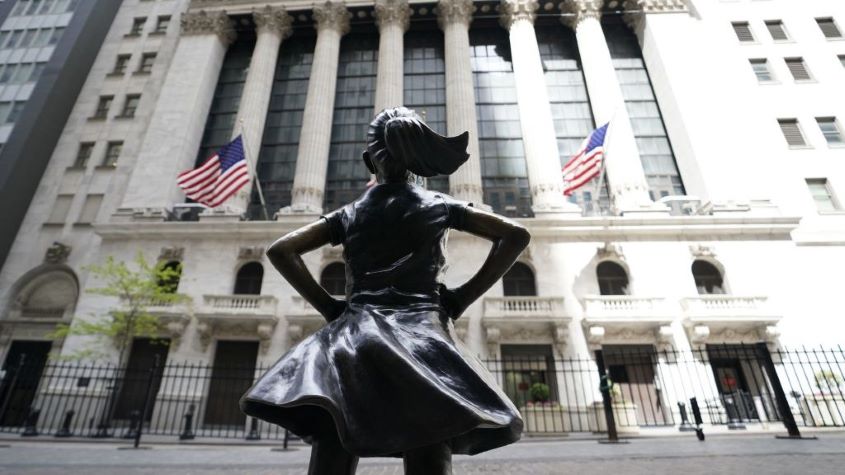Which assets would do best from the return of inflation?
If inflation becomes a genuine concern for investors, it would transform today's markets. John Stepek looks at which assets might prosper amid the turmoil.


Get the latest financial news, insights and expert analysis from our award-winning MoneyWeek team, to help you understand what really matters when it comes to your finances.
You are now subscribed
Your newsletter sign-up was successful
Want to add more newsletters?

Twice daily
MoneyWeek
Get the latest financial news, insights and expert analysis from our award-winning MoneyWeek team, to help you understand what really matters when it comes to your finances.

Four times a week
Look After My Bills
Sign up to our free money-saving newsletter, filled with the latest news and expert advice to help you find the best tips and deals for managing your bills. Start saving today!
Yesterday we talked about the time value of money – that’s the idea that money in the future is worth less than money in the present.
We talked about how we’ve been in an odd period where that gap in value between today’s money and tomorrow’s money has narrowed relentlessly, to the point where sometimes tomorrow’s money is considered to be worth more than today’s (that’s what negative interest rates really mean).
Today we consider what happens when that trend reverses.
MoneyWeek
Subscribe to MoneyWeek today and get your first six magazine issues absolutely FREE

Sign up to Money Morning
Don't miss the latest investment and personal finances news, market analysis, plus money-saving tips with our free twice-daily newsletter
Don't miss the latest investment and personal finances news, market analysis, plus money-saving tips with our free twice-daily newsletter
Interest rates are far, far lower than their 300-year average right now
Inflation and interest rates are closely tied together. There’s an obvious reason for that: if inflation is sitting at 2%, then you need to earn at least 2% a year on your money for it to maintain its value. Why would I lend you money at 1% a year, if it means I’m going to lose purchasing power? I might as well spend it now. Or put the money somewhere riskier that at least gives me the chance of a decent return, rather than a guaranteed loss after inflation.
So a borrower – which can be a government, or your high street bank (when you deposit money with the bank, that’s a loan from you to the bank) – will usually have to offer you a return that at least keeps up with inflation, and more typically, one that beats it.
For example, according to research published by the Bank of England's John Lewis in 2018 (here’s the piece if you want to read the original), a ten-year UK government bond has typically paid the holder a real interest rate of 2%-3%. That’s the average going back around 300 years. In other words, with inflation at 2%, the ten-year gilt would – on average – yield a bit under 5%.
Things have, however, changed drastically since the financial crisis in 2008. Calculated roughly, using my appalling Excel skills, in the decade running up to the end of 2007, the average real interest rate on the ten-year gilt was just above 3%. In the decade since then, it’s been just under 0% (about negative 0.1% to be more precise).
Why is that? Why would you accept such a massive drop in the real return on your money? The most obvious answer is because you expect things to get even worse. 2008 was a huge deflationary shock and ever since then, much of the global economy has teetered on the brink of deflation.
Markets are all about expectations. So if, as an investor, you expect inflation to turn negative in the future, then you might be happy to buy a gilt yielding 1% at a time when inflation is running at 2%. While 1% might look poor now, you’d rather lock it in because it’ll look good in a year’s time, say.
Rather than all that faffing about with yields, equity investors might prefer to look at it this way: you buy the bond at what looks like an expensive price, because market expectations, the general backdrop, and pure momentum, lead you to believe that it’ll go even higher.
Of course, all this talk of market expectations does ignore the fact that central banks have been buying bonds at any price offered for this entire period. So the market is also underwritten by that promise (although it’s worth noting that during periods of active quantitative easing (QE), bond yields have in fact tended to rise, as investors become less risk averse).
Anyway, so that’s what’s happened in the last decade or more. Investors have bought into the “secular stagnation” theory – the idea that strong economic growth is mostly a thing of the past and that what we all really have to worry about now is turning into something like 1990s and 2000s Japan. In short, they’ve been betting that tomorrow’s money will be worth pretty much exactly the same as today’s. So what happens if that changes?
Even if inflation rises, interest rates might not
Let’s say that inflation and economic growth surprise on the upside. Let’s say it turns out that secular stagnation is wrong, and that the “new normal” was just a blip in the course of the “old normal”, mostly resulting from the painful healing process that always follows a long drawn-out banking crisis.
What would that mean? With inflation rising, one thing it would mean is that the gap between the value of today’s money and that of tomorrow’s would start widening again. And investors would start to demand compensation for that. You might accept a negative real return today if you think that inflation will fall tomorrow. But you’re definitely not going to accept it if you think inflation is going to rise.
So that’s quite a dramatic shift in market psychology. The assets that benefit from rising inflation expectations – commodities and other real assets are the most obvious ones – are not the same as those which benefit from collapsing inflation expectations.
The most vulnerable asset has to be anything that pays you a fixed income. The value to you of a piece of paper that promises to pay you a fixed payment of £100 a year will go up if you expect inflation to fall, but it will drop if you expect inflation to rise. That’s what the bond market is facing.
However, the other big question is: will interest rates rise? And this is where it gets trickier. Put simply, governments can’t afford for interest rates to rise, so they won’t let them. They have many tools available to allow them to do that. This is called financial repression, and in our Christmas podcast (out Monday 21 December), Merryn will be talking to Russell Napier, one of our favourite analysts, about exactly how governments will go about it.
But it creates an interesting scenario. Both interest rates and inflation have been falling in recent decades. We’re now moving into a scenario where we may see inflation rising, but interest rates held static. What happens then? It’s a topic we’ll be discussing at our Christmas roundtable, too (which will be in our end-of-year double issue – get your first six issues free here if you don’t already subscribe).
But we can have a stab at a guess. Even if interest rates remain low, rising inflation will reduce the value of the big promised future cashflows from the likes of Tesla, and increase the value of actual real-life cashflows right now, from the likes of the oil companies, say. To my mind, that implies that the switch from “growth” to “value” (both terrible imprecise terms, but they sum up the point I’m making) has genuine legs.
It also implies that investors who are being denied a real return in one portion of their portfolios, might be forced to try to compensate for that by overweighting sectors with proven defences against inflation – such as commodities – compared to their historical allocations. In other words, you’d expect the inflows we’ve seen into miners and the like to continue too.
I looked at some of the best funds to play these sectors in last week's issue of MoneyWeek magazine. Again, if you haven’t already signed up, bag yourself an early Christmas pressie and subscribe to get your first six issues free now.
Get the latest financial news, insights and expert analysis from our award-winning MoneyWeek team, to help you understand what really matters when it comes to your finances.

-
 Should you buy an active ETF?
Should you buy an active ETF?ETFs are often mischaracterised as passive products, but they can be a convenient way to add active management to your portfolio
-
 Power up your pension before 5 April – easy ways to save before the tax year end
Power up your pension before 5 April – easy ways to save before the tax year endWith the end of the tax year looming, pension savers currently have a window to review and maximise what’s going into their retirement funds – we look at how
-
 The outlook for stocks is improving
The outlook for stocks is improvingThis is the best of times for investors, says Max King. Global risks are receding, but few have noticed.
-
 The building blocks for an income strategy: resilience, growth and diversification
The building blocks for an income strategy: resilience, growth and diversificationAdvertisement Feature Iain Pyle, Investment Manager, Shires Income plc
-
 Investment platforms offering measly interest rates on cash holdings – is your cash working hard enough?
Investment platforms offering measly interest rates on cash holdings – is your cash working hard enough?The interest rate on cash you hold within an investment account can be as low as 0.75%. We look at the worst cash rates on the market, and what you should do with your cash instead.
-
 Rethinking ESG investing
Rethinking ESG investingAnalysis Sustainable ESG funds are coming under attack for a lack of focus. Investors need to be selective
-
 Can a woman deliver you better returns?
Can a woman deliver you better returns?Tips Women often make better stock pickers than men, delivering stronger returns for investors - but with fewer females managing funds, how can you make sure you take advantage of the feminist touch when picking funds? Kalpana Fitzpatrick on how to filter funds run by women and why it matters.
-
 Flat fees vs percentage fees - are you paying too much for your investments?
Flat fees vs percentage fees - are you paying too much for your investments?We investigate whether it’s better to choose an investment platform with flat fees, or whether percentage charges could work out cheaper.
-
 What is a dividend yield?
What is a dividend yield?Videos Learn what a dividend yield is and what it can tell investors about a company's plans to return profits to its investors.
-
 Fund platform launches low cost £4.99 a month service for small investors - we see how it compares
Fund platform launches low cost £4.99 a month service for small investors - we see how it comparesAdvice Aimed at investors with small investment pots of £30k or less, fund platform interactive investors has launched a low costs service - but is it any good and how does it compare to rivals?